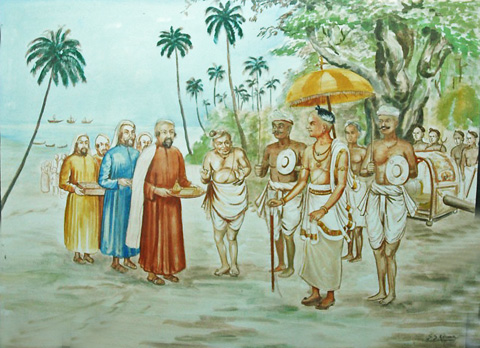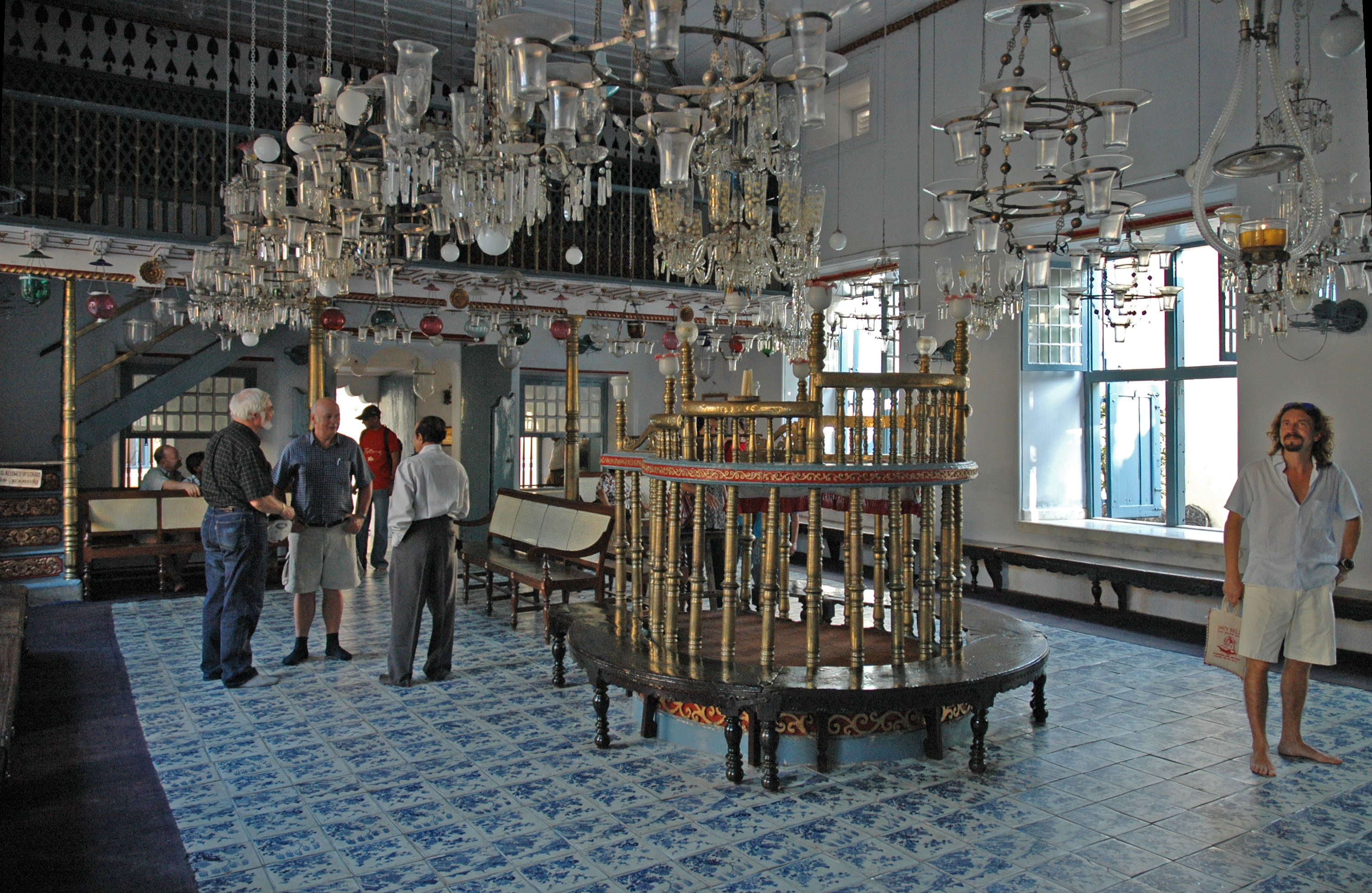|
Joseph Azar (prince)
Joseph Azar was a Jewish prince of the Anjuvannam in Cochin, South India. He was a descendant of Joseph Rabban. Azar lived in the 14th century CE. In 1340 Joseph Azar became embroiled in a conflict over succession with his brother. The ensuing strife led to intervention by neighboring potentates and the eradication of Jewish autonomy in South India. Sidney Mendelssohn (1920), The Jews of Asia, p. 109 Resources *Blady, Ken. ''Jewish Communities in Exotic Places''. Northvale, N.J.: Jason Aronson Inc., 2000. pp. 115–130. See also * Cochin Jews External linksJews of Cochin— Picture of Joseph Azar in the Paradesi Synagogue The Paradesi Synagogue aka Cochin Jewish Synagogue or the Mattancherry Synagogue (Malayalam: പരദേശി ജൂതപള്ളി) is a synagogue located in Mattancherry Jew Town, a suburb of the city of Kochi, Kerala, in India. It wa ... 14th-century Indian people Cochin Jews Mizrahi Jews Indian Jews Jewish royalty History of ... [...More Info...] [...Related Items...] OR: [Wikipedia] [Google] [Baidu] |
Cochin Jews
Cochin Jews (also known as Malabar Jews or Kochinim, from ) are the oldest group of Jews in India, with roots that are claimed to date back to the time of King Solomon. The Cochin Jews settled in the Kingdom of Cochin in South India, now part of the state of Kerala. As early as the 12th century, mention is made of the Jews in southern India by Benjamin of Tudela. They are known to have developed Judeo-Malayalam, a dialect of Malayalam language. Following their expulsion from Iberia in 1492 by the Alhambra Decree, a few families of Sephardi Jews eventually made their way to Cochin in the 16th century. They became known as Paradesi Jews (or Foreign Jews). The European Jews maintained some trade connections to Europe, and their language skills were useful. Although the Sephardim spoke Ladino (i.e. Spanish or Judeo-Spanish), in India they learned Judeo-Malayalam from the Malabar Jews.Katz 2000; Koder 1973; Thomas Puthiakunnel 1973. The two communities retained their ethnic an ... [...More Info...] [...Related Items...] OR: [Wikipedia] [Google] [Baidu] |
Anjuvannam
Anjuvannam (in Tamil and Malayalam, from Persian anjuman, and hanjama or hanjamana in Telugu or Kannada or hamyamana) typically refers to a medieval merchant guild, consisting of non-Indian traders (ethnic Persians and Arabs), primarily active in south India.Noburu Karashmia (ed.), ''A Concise History of South India: Issues and Interpretations.'' New Delhi: Oxford University Press, 2014. 136. Along with manigramam and ainurruvar (the Ayyavole Five Hundred), the anjuvannam merchant guild played a major role in the commercial activities of the region. Unlike manigiramam, which was also operating in Indian hinterland, the presence of anjuvannam is found only in coastal towns. The guild of anjuvannam was organised by West Asian traders that included Jewish, Syrian Christian, Muslim and Zoroastrian Parsi merchants operating in south India (mostly Indian Ocean trade). Historian Y. Subbarayalu had defined the anjuvannam guild as a "body of West Asian traders". The merchants gener ... [...More Info...] [...Related Items...] OR: [Wikipedia] [Google] [Baidu] |
Cochin
Kochi (), also known as Cochin ( ) ( the official name until 1996) is a major port city on the Malabar Coast of India bordering the Laccadive Sea, which is a part of the Arabian Sea. It is part of the district of Ernakulam in the state of Kerala and is commonly referred to as Ernakulam. Kochi is the most densely populated city in Kerala. As of 2011, it has a corporation limit population of 677,381 within an area of 94.88 km2 and a total urban population of more than of 2.1 million within an area of 440 km2, making it the largest and the most populous metropolitan area in Kerala. Kochi city is also part of the Greater Cochin region and is classified as a Tier-II city by the Government of India. The civic body that governs the city is the Kochi Municipal Corporation, which was constituted in the year 1967, and the statutory bodies that oversee its development are the Greater Cochin Development Authority (GCDA) and the Goshree Islands Development Authority (GIDA) ... [...More Info...] [...Related Items...] OR: [Wikipedia] [Google] [Baidu] |
South India
South India, also known as Dakshina Bharata or Peninsular India, consists of the peninsular southern part of India. It encompasses the Indian states of Andhra Pradesh, Karnataka, Kerala, Tamil Nadu, and Telangana, as well as the union territories of Lakshadweep and Puducherry, comprising 19.31% of India's area () and 20% of India's population. Covering the southern part of the peninsular Deccan Plateau, South India is bounded by the Bay of Bengal in the east, the Arabian Sea in the west and the Indian Ocean in the south. The geography of the region is diverse with two mountain ranges – the Western and Eastern Ghats – bordering the plateau heartland. The Godavari, Krishna, Kaveri, Tungabhadra, Periyar, Bharathappuzha, Pamba, Thamirabarani, Palar, and Vaigai rivers are important perennial rivers. The majority of the people in South India speak at least one of the four major Dravidian languages: Tamil, Telugu, Malayalam and Kannada (all 4 of which are among ... [...More Info...] [...Related Items...] OR: [Wikipedia] [Google] [Baidu] |
Joseph Rabban
Joseph Rabban (old Malayalam:Narayanan, M. G. S. ''Perumāḷs of Kerala: Brahmin Oligarchy and Ritual Monarchy: Political and Social Conditions of Kerala Under the Cēra Perumāḷs of Makōtai (c. AD 800 - AD 1124).'' Thrissur (Kerala): CosmoBooks, 2013. 451-52. Issuppu Irappan, also Yusuf/Oueseph Rabban) was a prominent Jewish merchant/aristocrat in the entrepôt of Kodungallur (Muyirikkottu) on the Malabar Coast, India in early 11th century AD. According to the Jewish copper plates of Cochin (c. 1000 AD), a charter issued by the Chera king at Kodungallur, Rabban was granted the rights of merchant guild anjuman/hanjamana along with several other trade rights and aristocratic privileges. He was exempted from all payments made by other settlers in the city of Muyirikkottu to the king (at the same time extending to him all the rights of the other settlers). These rights and privileges were given perpetuity to all his descendants. Anjuman was a south Indian merchant guild organis ... [...More Info...] [...Related Items...] OR: [Wikipedia] [Google] [Baidu] |
Potentate
Potentate may refer to: * Imperial Potentate, the title of the head of the Shriners Shriners International, formally known as the Ancient Arabic Order of the Nobles of the Mystic Shrine (AAONMS), is an American Masonic society established in 1870 and is headquartered in Tampa, Florida. Shriners International describes itself ... * Potentate, three-time winner of the Welsh Champion Hurdle (1997-1999) * St. Ambrose's term for a Power in Christian angelology {{disambiguation ... [...More Info...] [...Related Items...] OR: [Wikipedia] [Google] [Baidu] |
Jason Aronson
Jason Aronson was an American publisher of books in the field of psychotherapy. Topics dealt with in these books include child therapy, family therapy, couple therapy, object relations therapy, play therapy, depression, eating disorders, personality disorders, substance abuse, sexual abuse, stress, trauma, bereavement, and other subjects. Jason Aronson, Inc. Publishers, founded by its namesake Dr. Jason Aronson (an American psychologist), was acquired by Rowman & Littlefield Publishers Rowman & Littlefield Publishing Group is an independent publishing house founded in 1949. Under several imprints, the company offers scholarly books for the academic market, as well as trade books. The company also owns the book distributing compa ..., Inc. in December 2003, and since then it operated as an imprint. Jason Aronson also released new books in the field of Jewish studies. These included titles covering Jewish life, history, theology, genealogy, folklore, holidays, and Hasidi ... [...More Info...] [...Related Items...] OR: [Wikipedia] [Google] [Baidu] |
Paradesi Synagogue
The Paradesi Synagogue aka Cochin Jewish Synagogue or the Mattancherry Synagogue (Malayalam: പരദേശി ജൂതപള്ളി) is a synagogue located in Mattancherry Jew Town, a suburb of the city of Kochi, Kerala, in India. It was built in 1568 A.D. by Samuel Castiel, David Belila, and Joseph Levi for the flourishing Paradesi Jewish community in Kochi. Cochin Jews were composed mainly of the much older Malabari Jews and the newly arrived Sephardic refugees from the Portuguese religious persecution of Jews in Spain and Portugal. It is the oldest active synagogue in the Commonwealth of Nations.The Paradesi Synagogue, Cochin, India Database of Jewish Communities, Museum of the Jewish People at Beit Hatfutsot. Accessed online 13 February 2007. ''Paradesi'' is a word used in several [...More Info...] [...Related Items...] OR: [Wikipedia] [Google] [Baidu] |
14th-century Indian People
As a means of recording the passage of time, the 14th century was a century lasting from 1 January 1301 ( MCCCI), to 31 December 1400 ( MCD). It is estimated that the century witnessed the death of more than 45 million lives from political and natural disasters in both Europe and the Mongol Empire. West Africa experienced economic growth and prosperity. In Europe, the Black Death claimed 25 million lives wiping out one third of the European population while the Kingdom of England and the Kingdom of France fought in the protracted Hundred Years' War after the death of Charles IV, King of France led to a claim to the French throne by Edward III, King of England. This period is considered the height of chivalry and marks the beginning of strong separate identities for both England and France as well as the foundation of the Italian Renaissance and Ottoman Empire. In Asia, Tamerlane (Timur), established the Timurid Empire, history's third largest empire to have been ever establish ... [...More Info...] [...Related Items...] OR: [Wikipedia] [Google] [Baidu] |
Mizrahi Jews
Mizrahi Jews ( he, יהודי המִזְרָח), also known as ''Mizrahim'' () or ''Mizrachi'' () and alternatively referred to as Oriental Jews or ''Edot HaMizrach'' (, ), are a grouping of Jewish communities comprising those who remained in the Land of Israel and those who existed in diaspora throughout and around the Middle East and North Africa (MENA) from biblical times into the modern era. In current usage, the term ''Mizrahi'' is almost exclusively applied to descendants of Jewish communities from Western Asia and North Africa; in this classification are the descendants of Mashriqi Jews who had lived in Middle Eastern countries, such as Iraqi Jews, Kurdish Jews, Lebanese Jews, Syrian Jews, Egyptian Jews, Yemenite Jews, Turkish Jews, and Iranian Jews; as well as the descendants of Maghrebi Jews who had lived in North African countries, such as Libyan Jews, Tunisian Jews, Algerian Jews, and Moroccan Jews. These various Jewish communities were first offici ... [...More Info...] [...Related Items...] OR: [Wikipedia] [Google] [Baidu] |
Indian Jews
The history of the Jews in India dates back to antiquity.''The Jews of India: A Story of Three Communities'' by Orpa Slapak. The Israel Museum, Jerusalem. 2003. p. 27. .Weil, Shalva. ''India's Jewish Heritage: Ritual, Art, and Life-Cycle''. Mumbai: Marg Publications 2009. Judaism was one of the first foreign religions to arrive in [...More Info...] [...Related Items...] OR: [Wikipedia] [Google] [Baidu] |
Jewish Royalty
Jews ( he, יְהוּדִים, , ) or Jewish people are an ethnoreligious group and nation originating from the Israelites Israelite origins and kingdom: "The first act in the long drama of Jewish history is the age of the Israelites""The people of the Kingdom of Israel and the ethnic and religious group known as the Jewish people that descended from them have been subjected to a number of forced migrations in their history" and Hebrews of historical Israel and Judah. Jewish ethnicity, nationhood, and religion are strongly interrelated, "Historically, the religious and ethnic dimensions of Jewish identity have been closely interwoven. In fact, so closely bound are they, that the traditional Jewish lexicon hardly distinguishes between the two concepts. Jewish religious practice, by definition, was observed exclusively by the Jewish people, and notions of Jewish peoplehood, nation, and community were suffused with faith in the Jewish God, the practice of Jewish (religious) la ... [...More Info...] [...Related Items...] OR: [Wikipedia] [Google] [Baidu] |

.png)
.jpg)


